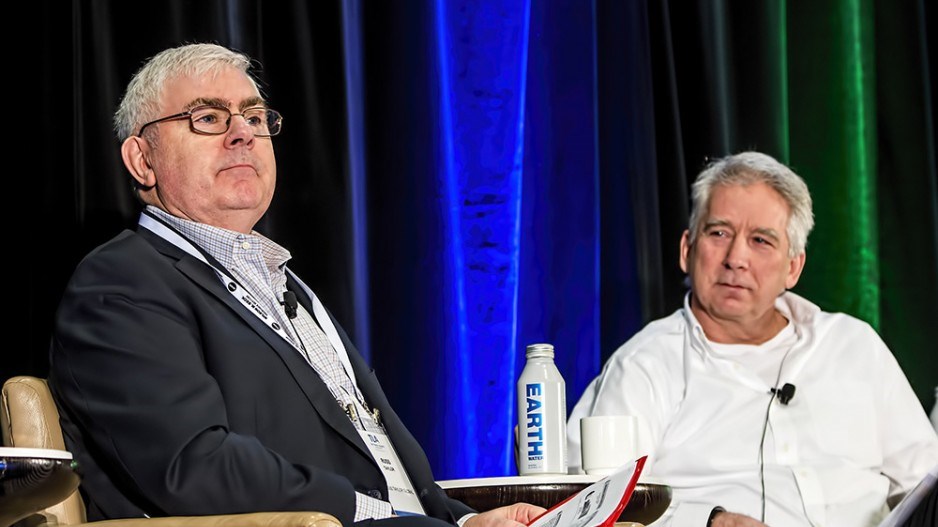It was perhaps akin to announcing funding for a new fish processing plant in response to the total collapse of fish stocks.
In response to last week’s announcement by Canfor Corp. (TSX:CFP) that it will permanently shutter its pulp mill in Prince George, Premier David Eby yesterday announced a $90 million fund aimed at encouraging investments in value-added wood industries, from sawmill retooling to new engineered wood product manufacturing.
While that is “nice,” it completely misses the point, David Elstone, president of Spar Tree Group, writes in in his View From the Stump newsletter – the point being that there is simply not enough affordable timber in B.C. to sustain the current number of operating sawmills and pulp mills.
“I know of several companies that could be pulling the trigger on planned investments, but they will not,” Elstone writes. “It’s not for lack of capital, but the lack of predictable fibre supply.”
Analysts speaking at the BC Truck Loggers Association Convention in Vancouver Wednesday echoed Elstone’s point that value-added manufacturing -- like the mass timber sector the NDP government has been aggressively promoting -- can't thrive anymore than sawmills can if there are no logs available.
“If the future is mass timber, you still need lumber to make mass timber,” said Paul Quinn, paper and forest products analyst with RBC Capital Markets.
While there is a growing market for engineered wood products like mass timber, companies won’t invest in new manufacturing facilities if there is a fundamental lack of fibre and if costs are too high, said Russ Taylor, president of Russ Taylor Global wood business and market consultant.
“Lumber’s pretty important to make CLT,” he said. “You have to have a healthy sawmilling industry, and you have to have a fair stumpage and stable timber volumes to make the sawmill costs competitive and fair.”
Canfor’s announcement last week that it will close its pulp mill in Prince George – resulting in a loss of 300 high-paying jobs – is just the latest in a series of sawmill and pulp and paper mills closures or curtailments in B.C.
Elstone notes that more than 30% of the B.C.’s interior’s sawmills are currently either permanently shuttered, or temporarily or indefinitely curtailed, and there have been three permanent pulp mill closure announcements since 2021 – four, if you count Canfor's Taylor pulp mill, which was indefinitely curtailed in 2021.
“These four mills represent 20% of the current pulp and paper capacity in the province and are no longer serving as the major centres of employment and economic activity,” Elstone notes.
“This amount of lumber and pulp capacity affected in such a short time frame seems unprecedented.”
The current wave of sawmill and pulp and paper mills curtailments and closures are the result of a declining supply of timber and high operating costs – i.e. high stumpage rates.
While the NDP government can’t be blamed for the pests and forest fires that raged through B.C. forests, dramatically shrinking the annual allowable cut (AAC), industry analysts do blame the NDP government for policies that have further decreased the timber supply.
Quinn went so far as to suggest the current government is indifferent to the plight of forestry dependent communities because that’s not where its voter base is.
“The NDP doesn’t care about the industry,” Quinn said. “Why? Because their political base is not in forest dependent communities.”
Several policies implemented since the NDP formed government has further restricted access to logs, the most significant one being a moratorium on logging in areas with old growth, which had an immediate impact on BC Timber Sales.
“The dramatic drop in B.C. Interior’s crown timber harvest specific to 2022 would appear to be more to do with policy decisions than anything else,” Elstone writes. “Policy decisions that the NDP government made.”
No other region in North America has seen the wave of curtailments and closures that B.C. has, Elstone notes.
Taylor noted that sawmill capacity in the U.S. – mainly the Southern U.S. – has grown 40 per cent since 2014, while B.C. sawmill capacity declined 30 per cent.
In 2022 alone, the province’s crown-land harvest declined by 6 million cubic metres (13 per cent), Elstone notes.
Earlier today, the government announced another new policy that will reduce the annual allowable cut in the Fort St. John region by 350,000 cubic metres. That policy is part of a new land use agreement with the Blueberry River First Nation – something necessitated by a BC Supreme Court ruling that found the cumulative impacts of industrial development constituted a breach of the First Nations’ Treaty 8 rights.
In addition to a fundamental decline in harvestable timber, the costs of logging in B.C. have made it uneconomic for many sawmill owners to operate.
That’s largely related to stumpage rates (a charge for each tree cut on Crown land) and the way they are calculated in B.C. There is a three-month lag between lumber prices and stumpage rate adjustments, which isn’t an issue when lumber prices are stable, Taylor said. But when lumbers prices are volatile, as they were in 2021 and 2022, sawmills can end up paying stumpage rates that out of line with lumber prices.
As of December 2022, Taylor said stumpage rates in B.C. were $62 per cubic metre for the Interior, $41 on the coast, and $13 in Alberta.
Asked whether B.C. could simply move to a stumpage rate system similar to Alberta’s, Taylor said it's possible, but could have consequences -- namely it might bolster American protectionism, which already has resulted in countervailing duties on Canada softwood lumber.
"It could be worse than doing nothing," Taylor said.
Premier David Eby will have a chance to defend his government's policies on forestry tomorrow, when he gives a keynote address to the Truck Loggers Association Convention.



